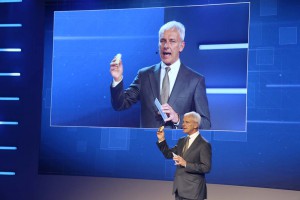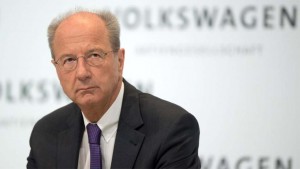
VW CEO Matthias Mueller his now at the center of an investigation by German prosecutors over the ongoing diesel emissions scandal.
Already focused on a number of former Volkswagen employees, German prosecutors today said they are also investigating the possible role CEO Matthias Mueller may have played in the attempt to cover up VW’s diesel emissions scandal.
Specifically, Mueller and at least two others may have failed to properly informed regulators and investors soon enough once they learned that Volkswagen engineers had developed a so-called defeat device in an attempt to fool diesel vehicle emissions tests.
Even while the probe expands, however, news reports from Germany indicate Rupert Stadler, the CEO of VW’s Audi luxury brand, will have his contract extended five years. Though well-rated for his handling of Audi overall, Stadler has come under fire for his own, alleged role in the diesel scandal.
The expanded investigation by German prosecutors now targets Mueller, the ongoing criminal probe is looking into the actions of his predecessor, Martin Winterkorn, who resigned as chief executive in 2015, shortly after the emissions scandal broke in September of that year. Also in the crosshairs is Hans Dieter Poetsch, Volkswagen’s board chairman.
(For more about Mueller’s possible role in the diesel emissions scandal, Click Here.)
There are several different investigations underway in Germany, as well as the United States. At one level, prosecutors have been trying to figure out who came up with the idea of rigging the software used to control Volkswagen’s 2.0- and 3.0-liter diesel engines. That allowed them to reduce emissions levels when undergoing government testing. In real-world conditions, however, the engines produced as much as 40 times more noxious exhaust gases than permitted by law.
After originally claiming the scam was the work of a “handful” of “rogue engineers,” prosecutors in the U.S. indicted seven current and former VW employees, some in mid-level management roles. One pleaded guilty in U.S. District Court last year. Another is set to go on trial in early 2018 and remains locked up in a federal prison in Michigan. The others are in Germany, out of reach of American authorities.
German prosecutors have been looking at not only the effort to rig diesel engines but also at what they believe was a cover-up by top management. The concern is that chief executive Mueller, former CEO Winterkorn and others may have learned about the subterfuge but waited to advise both regulators and VW shareholders. Once the U.S. Environmental Protection Agency publicly accused the carmaker of cheating in 2015 VW’s stock tumbled sharply.
The automaker is also facing a lawsuit by shareholders who hoped to recoup some of their losses.
(VW offers big deals on fixed diesel leftovers. Click Here for the story.)
VW has already agreed to spend about $30 billion in the U.S. to cover civil and criminal claims. That includes buyback programs affecting the vast majority of the vehicles using the rigged engines sold in the States, as well as fines and payments to U.S. dealers for lost sales and profits. All told, about 11 million vehicles were equipped with the suspect software, around 550,000 of those sold in the United States.
In a statement, Porsche SE, the holding company that controls the majority of VW shares, denied the latest allegations by German prosecutors, declaring, “We are convinced that we have duly fulfilled our capital market disclosure requirements.”
For his part, Audi CEO Rupert Stadler has not been named a direct target of the ongoing investigation, though the 54-year-old executive has been criticized for some of his actions. And he will be questioned by shareholders on Thursday about a March 15 raid by prosecutors of Audi offices.
(Sales on the rebound, VW delivers big surge in Q1 earnings. Click Here for the story.)
Audi used both of the rigged diesel engines in various models sold in the U.S. and other parts of the world.

